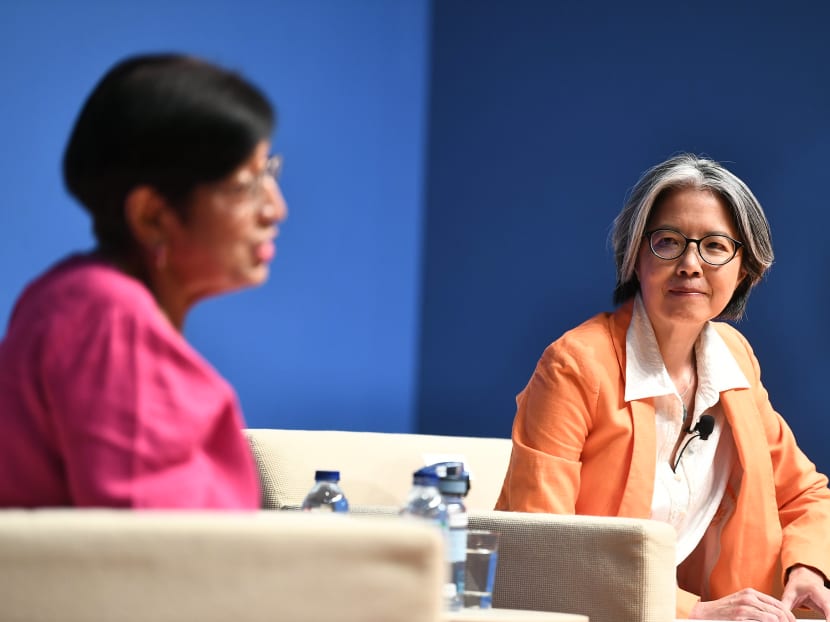Include gender equality in Singapore’s National Pledge and Constitution, says Aware executive director at IPS lecture
SINGAPORE — Gender equality should be reflected in both Singapore’s National Pledge and Constitution, if it is to be established as a fundamental value in its society, former lawyer Corinna Lim said. Doing that would be one of the most “visible and substantive” actions the Government can take to make gender equality a fundamental value, she added.

Women's rights activist and former lawyer Corinna Lim (pictured) said that women in Singapore are highly educated and empowered, but do not have equality yet.
- Former lawyer and Aware’s executive director Corinna Lim hopes to see gender equality inscribed in Singapore’s National Pledge and Constitution
- So far, equality on the basis of race and religion is reflected in these documents
- She hopes that an upcoming White Paper on gender equality will set out a clear plan to achieve this
- She would also like to see men being involved as part of the conversations on these issues
SINGAPORE — Gender equality should be reflected in both Singapore’s National Pledge and Constitution, if it is to be established as a fundamental value in its society, former lawyer Corinna Lim said.
Doing that would be one of the most “visible and substantive” actions the Government can take to make gender equality a fundamental value, she added.
The executive director of the Association of Women for Action and Research (Aware), a gender equality advocacy group, was speaking on Thursday (April 29) at a lecture series organised by the Institute of Policy Studies, a think tank under the National University of Singapore.
Ms Lim said: “Currently, gender equality does not appear in either of these documents, unlike equality on the basis of race and religion.
“If gender equality is to be established as a fundamental value in our society, this should be reflected in both the pledge and the Constitution, which are the two most authoritative expressions of Singapore’s values.”
She noted that women have made substantive strides alongside the country’s development, with many more who are educated and working these days.
“Women in Singapore are highly educated and empowered, but we don't have equality yet.”
Ms Lim was speaking on this topic in the first of three lectures as the eighth SR Nathan Fellow for the Study of Singapore for the 2021 academic year. The fellowship, which was launched in late 2012, was to advance research on public policy and governance issues.
Law and Home Affairs Minister K Shanmugam announced in September last year that the Government is undertaking a review of issues affecting women, which will culminate in a White Paper that will be delivered in Parliament in the first half of this year.
He had said that the purpose of this initiative is to shift the Singaporean culture and mindset on gender equality and respect for women, and that it should be imprinted in society’s collective consciousness.
Ms Lim said that there are two ways the Government can make gender equality a value of Singapore’s society.
It can either amend Article 12(2) of the Constitution by adding “gender” as an additional ground for prohibiting discrimination. Currently, religion, race, descent or place of birth are listed.
If that cannot be done, she said that adding a new clause that is aspirational would add symbolic value even though it may not require concrete actions to be taken by the Government.
Besides amending the pledge and the Constitution, Ms Lim also hopes that the White Paper to be tabled in Parliament will be “bold, visionary, substantive and long-term”.
“It should (be) a clear and comprehensive plan that sets out the steps that the Government will take to role-model, signal and set in place laws, policies and programmes to achieve its objective,” she said.
In the course of engaging with women’s rights and gender equality advocacy groups through this review, the Government should involve men in this series of dialogues, not just as male allies, but as individuals on the other side of gender equality, she added.
WOMEN ACTIVE IN POLITICS
In her lecture on Thursday, Ms Lim delved into the history of the women’s rights movement in Singapore, starting from its pre-independence days.
She painted a picture of how women, since the 1950s, were very active in politics and civil society, and actively lobbied the People’s Action Party (PAP) to abolish polygamy, which led to the establishment of the Women’s Charter in 1961.
With the dissolution of polygamy achieved such that men cannot take more than one wife, women’s participation in social activism and politics dwindled in the 1970s, leading to what Ms Lim termed as “The Men’s Years”, which essentially refers to the all-male Parliament here until 1984.
She pointed out that it was during this period that the Government introduced its most sexist policies such as having quotas for female medical students and only having medical benefits for male civil servants.
With the introduction of female politicians again in 1984, Ms Lim said that the community of women rallied together again to campaign on women’s rights, with the focus on family violence this time.
One notable change was the amendments made to the Women’s Charter to provide more protection for women in domestic abuse situations.
The most recent phase of the women’s liberation movement is the social media era, where many ground-up initiatives, some existing in a purely online form, were set up by various young activists.
In her next two lectures, Ms Lim will talk about caregiving and gender equality in the home environment, as well as sexual violence.











